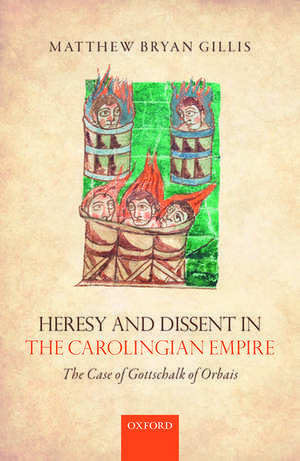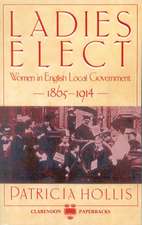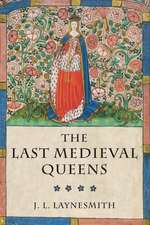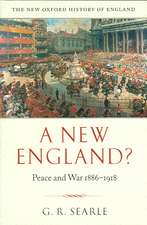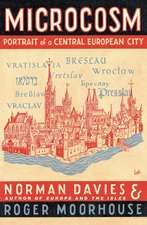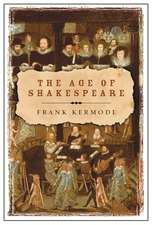Heresy and Dissent in the Carolingian Empire: The Case of Gottschalk of Orbais
Autor Matthew Bryan Gillisen Limba Engleză Hardback – 16 feb 2017
Preț: 598.84 lei
Preț vechi: 858.82 lei
-30% Nou
Puncte Express: 898
Preț estimativ în valută:
114.59€ • 122.53$ • 95.54£
114.59€ • 122.53$ • 95.54£
Carte tipărită la comandă
Livrare economică 07-14 aprilie
Preluare comenzi: 021 569.72.76
Specificații
ISBN-13: 9780198797586
ISBN-10: 0198797583
Pagini: 288
Dimensiuni: 160 x 241 x 24 mm
Greutate: 0.54 kg
Editura: OUP OXFORD
Colecția OUP Oxford
Locul publicării:Oxford, United Kingdom
ISBN-10: 0198797583
Pagini: 288
Dimensiuni: 160 x 241 x 24 mm
Greutate: 0.54 kg
Editura: OUP OXFORD
Colecția OUP Oxford
Locul publicării:Oxford, United Kingdom
Recenzii
Gillis excels at unpacking and weaving a wide variety of sources, hymns, letters, poems, exegetical texts, sermons, and even the Heliand, into a coherent narrative that deftly combines elements of personal history, theology, and questions of authority in the Carolingian world.
Gillis' effort is a welcome addition to expanding scholarly understanding of the early medieval world...Gillis' book paints an effective and vivid portrait of the complicated, heated, and coercive aspects of the Carolingian Renewal.
Gillis has produced an impressive and nuanced study. He has taken care to explore Gottschalk's experiences and ideas in the round, and to engage with his varied output that ranged from theological treatises to poems and hymns.
The image of Gottschalk of Orbais as the fanatical thinker of one idea, who was harshly condemned and then nursed his resentment over a lifetime, is not far from the truth, as we learn from this finely researched and crisply written book.
Gillis presents an interesting, important, and largely original book.
Heresy and Dissent in the Carolingian Empire is successful at portraying the career of a rogue 9th-century theologian. Although Gottshalk's case is exceptional, it illustrates in vivid and compelling ways the means by which one stubborn thinker could challenge church authorities about fundamental Christian doctrines, even from prison... Gottshalk's imprisonment in Hautvillers provides an excellent example of the networks of information exchange that made the walls of early medieval cloisters much more porous than they usually seem. Historians of early medieval religion will find much to ponder in Gottshalk's notorious career, which Gillis has presented with admirable erudition and attention to detail.
Gillis's excellent book brings the life and ideas of this entrancing early medieval heretic to the attention of a new generation of scholars.
This is an important study that scholars of the Carolingian world and of early-medieval religious culture in general will read and use for many years to come. It is a book we should be grateful to have.
This could be simply a story about the power of Carolingian bishops in suppressing dissenting voices, yet Gillis is able to demonstrate that Gottschalk had considerable agency.
Gillis' effort is a welcome addition to expanding scholarly understanding of the early medieval world...Gillis' book paints an effective and vivid portrait of the complicated, heated, and coercive aspects of the Carolingian Renewal.
Gillis has produced an impressive and nuanced study. He has taken care to explore Gottschalk's experiences and ideas in the round, and to engage with his varied output that ranged from theological treatises to poems and hymns.
The image of Gottschalk of Orbais as the fanatical thinker of one idea, who was harshly condemned and then nursed his resentment over a lifetime, is not far from the truth, as we learn from this finely researched and crisply written book.
Gillis presents an interesting, important, and largely original book.
Heresy and Dissent in the Carolingian Empire is successful at portraying the career of a rogue 9th-century theologian. Although Gottshalk's case is exceptional, it illustrates in vivid and compelling ways the means by which one stubborn thinker could challenge church authorities about fundamental Christian doctrines, even from prison... Gottshalk's imprisonment in Hautvillers provides an excellent example of the networks of information exchange that made the walls of early medieval cloisters much more porous than they usually seem. Historians of early medieval religion will find much to ponder in Gottshalk's notorious career, which Gillis has presented with admirable erudition and attention to detail.
Gillis's excellent book brings the life and ideas of this entrancing early medieval heretic to the attention of a new generation of scholars.
This is an important study that scholars of the Carolingian world and of early-medieval religious culture in general will read and use for many years to come. It is a book we should be grateful to have.
This could be simply a story about the power of Carolingian bishops in suppressing dissenting voices, yet Gillis is able to demonstrate that Gottschalk had considerable agency.
Notă biografică
Matthew Bryan Gillis is Assistant Professor of History at the University of Tennessee, Knoxville. His research and teaching focus on early medieval Europe.
